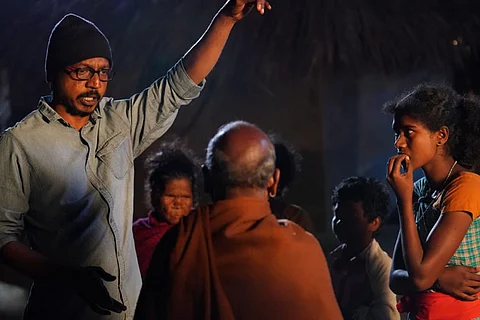

Twenty people of the Paniya tribe, an ethnic group in Wayanad, gathered funds, got on a 17-seat traveller and rode from Wayanad to Thiruvananthapuram, to watch a film. On the morning of December 8, they walked into the Kairali Theatre where Kenjira, a film made in the Paniya language, was being screened as part of the International Film Festival of Kerala (IFFK). They were the actors of this film. The 20 of them and a few other actors came to watch the first movie they acted in. When the movie ended, they danced, they celebrated, and the director of the film, Manoj Kana, joined in the fun and laughter.
“I have been living among them for more than two decades now. Of course, I know the Paniya language and a few other tribal languages too,” says Kana, whose two films before this – Chayilyam and Amoeba – were both critically acclaimed. Amoeba won a state award.
Those were in Malayalam. Kenjira had to be made in the language his dear actors spoke. It used sync sound too. “There were a few workshops for acting. The lead character in the film – Kenjira – is played by Vinusha, a class IX student. There were also actors who have worked with me before in theatre,” Kana says.
That’s what he has been doing there for 20-plus years. Kana landed in Wayanad as part of a statewide street play he and his team were putting up at random places such as bus stops. “It was a play called Njangal Indiakkar Samsarikkunnu, a counter play to Pradeep Dalvi’s Marathi play Mee Nathuram Godse Boltoy (I am Nathuram Godse speaking). When we put up a show in Wayanad, we met KK Surendran, a lecturer, and James sir, a priest without the robes of one. They asked us to perform for the tribal people. That’s when I first came to understand the plight they were living in.”
Still from Kenjira
He began writing plays to talk about their issues. When there were so many dropouts that an LP (lower primary) school had to shut down in Muthanga, Kana wrote a play on the importance of sending kids to schools and staged it in the Adivasi colonies multiple times. “Till they began sending kids to school again,” he says. Another time he made a play to address the issue of hunger-deaths, a claim denied by the then government.
“All my actors were tribal people. But then theatre can do only so much, it will not reach everywhere, only the people gathered around to watch the play. I realised a better medium to reach out would be cinema,” Kana says.
So in Kenjira, he tells a colony’s state through his central character, the schoolgirl. “The Adivasis are suppressed and abused on multiple levels. Through even other colony members and through the society. They face so much of humiliation that at one point they believe they are not worthy at all, there is a low self-esteem. It is this that we broke at the IFFK. There, they were the stars and the audience that included the Minister for Welfare of Scheduled Castes, Scheduled Tribes and Backward Classes AK Balan, were there to watch them,” Kana says.
Read: